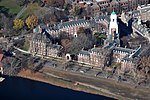Anderson Memorial Bridge
1915 establishments in MassachusettsArch bridges in the United StatesBridges completed in 1915Bridges in BostonBridges in Middlesex County, Massachusetts ... and 6 more
Bridges over the Charles RiverBuildings and structures in Cambridge, MassachusettsConcrete bridges in the United StatesCulture of BostonMonuments and memorials in MassachusettsRoad bridges in Massachusetts

Anderson Memorial Bridge (commonly but incorrectly called Larz Anderson Bridge) connects Allston, a neighborhood of Boston, and Cambridge. The bridge stands on the site of the Great Bridge built in 1662, the first structure to span the Charles River. It brings Boston traffic (from North Harvard Street) into Harvard Square (via JFK Street) and was finished in 1915.
Excerpt from the Wikipedia article Anderson Memorial Bridge (License: CC BY-SA 3.0, Authors, Images).Anderson Memorial Bridge
John F. Kennedy Street, Cambridge Cambridgeport
Geographical coordinates (GPS) Address External links Nearby Places Show on map
Geographical coordinates (GPS)
| Latitude | Longitude |
|---|---|
| N 42.3689 ° | E -71.1232 ° |
Address
Anderson Memorial Bridge
John F. Kennedy Street
02163 Cambridge, Cambridgeport
Massachusetts, United States
Open on Google Maps






